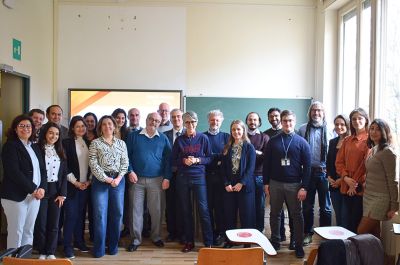
The members of the RENOVATE project gathered for two consecutive days for its official kick-off meeting at the University of Pavia. The meeting aimed at planning the first and upcoming research activities and discussing the expected outcomes that will boost the recycling and re-use of batteries, cell materials, and related components. The ultimate goal is to foster new circular economy solutions for the European battery value chain.
RENOVATE is funded by Horizon Europe, the European Union’s key programme for Research and Innovation, part of which addresses Climate, Energy, and Mobility.
The meeting was hosted by the project coordinator, the National Interuniversity Consortium of Materials Science and Technology - INSTM, the biggest network in Italy working on material research, involving 52 Italian universities and 3000 researchers. In it participated Politecnico di Milano, Iberian Centre for Research in Energy Storage – CIIAE, Helmholtz Institute Ulm HIU Electrochemical Energy Storage, founded by the Karlsruhe Institute of Technology, SYENSQO, SVOLT, BALance Technology Consulting, ERP Italia Servizi, LOMARTOV, FAAM, and Organik Kimya, including the University of Pavia and the University of Milano-Bicocca as associated partners.
RENOVATE members, through their direct involvement in circular batteries and chemical processing, focus on recycling processes and performance, to achieve the closed-loop circular approach. In parallel, they aim to communicate and disseminate their work to a large audience, specialists, and non-specialists for a wider impact of the project.
The project consortium had the opportunity to visit the R2BATT Lab “Batteries Recycling and Reuse” of the Department of Chemistry of the University of Pavia and see the R&D laboratory in which several RENOVATE activities will be performed.
RENOVATE is a three-year project, whose final goal is to validate novel, innovative, and sustainable recycling technologies at Technology Readiness Level 4, meaning the technology will be validated at a laboratory level. The aim is also to accelerate the integration of recycled contents (including production scraps) as secondary raw materials into the manufacturing of new cells. The environmental and economic impacts of the technologies will be assessed using methods of the Life Cycle Assessment (LCA) and Life Cycle Costing (LCC), allowing us to find strategies for higher recovery performance.
Two departments of Politecnico di Milano are involved in the project: the Mechanical Department with the research group of Professor Marcello Colledani and the Chemical Department with the research group of Professor Pierangelo Metrangolo. The research team of the Department of Mechanical Engineering is leading the project work package #2 “High-voltage-fragmentation physical sorting/separation and materials recovery” which aims to develop and validate a demand-driven de-manufacturing process-chains for high liberation of re-usable components and materials from battery waste feeds, minimizing energy and process costs and reducing the exposure of the operator to risks. The research group of Prof. Colledani will exploit the machinery of the CIRC-eV Laboratory of Politecnico di Milano to perform several activities of the project. The chemical Department will, instead, focus on devising innovative green chemistry routes to recover and reuse various chemical materials from battery waste feeds, such as binder, electrolyte, and graphite. In particular, Professor Metrangolo’s team will develop methods for polymer extraction using sub- and super-critical fluids.
